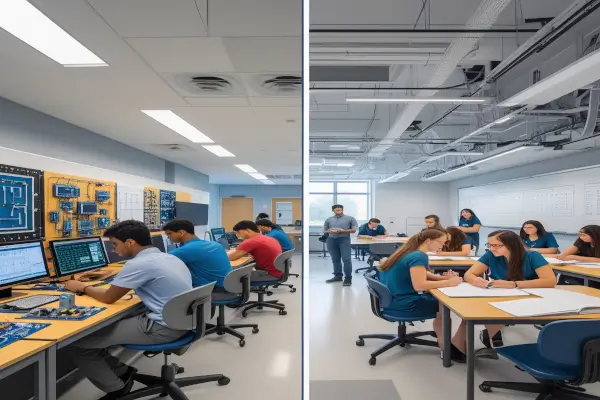Choosing a college major is one of the most important academic decisions you’ll make, and it often involves choosing between two broad categories: STEM (Science, Technology, Engineering, and Mathematics) and Humanities. While STEM fields are frequently associated with high salaries and job security, humanities majors offer deep insight into human behavior, communication, and culture—skills that are equally valuable in today’s world. If you’re trying to decide between engineering, a technical STEM path, and psychology, a human-focused humanities or social sciences field, this article will help you evaluate both options and find the major that suits your goals, strengths, and vision for the future.
Understanding the Core of Each Field
What Is STEM?
STEM majors encompass disciplines that focus on analytical reasoning, logic, technology, and empirical data. Engineering is a cornerstone of this category, involving the application of math and science to solve real-world problems and design systems, structures, or products.
Common Characteristics of STEM Majors:
- Strong focus on mathematics and quantitative skills
- Problem-solving orientation
- Often leads to careers in high-demand, high-tech industries
- Structured and curriculum-heavy programs
What Is Humanities?
Humanities majors, such as psychology, sociology, philosophy, literature, and history, explore the human experience. Psychology in particular blends the analytical rigor of science with the empathetic and observational traits of humanities, making it a fascinating hybrid field.
Common Characteristics of Humanities Majors:
- Emphasis on critical thinking and analysis
- Strong reading, writing, and communication components
- Exploration of human behavior, ethics, culture, and identity
- Often interdisciplinary and open to interpretation
Comparing Engineering and Psychology
Career Paths and Job Market
Engineering Careers:
Graduates in engineering enjoy a wide range of opportunities, from civil infrastructure to aerospace, mechanical design, and tech innovation. The profession is widely regarded for its competitive salaries and strong demand across the globe.
Psychology Careers:
A psychology degree can lead to careers in mental health, education, marketing, human resources, and research. However, higher-level positions in clinical or counseling psychology often require graduate studies.
Verdict: Engineering offers earlier access to high-paying jobs straight out of undergraduate programs. Psychology offers breadth, but may require further specialization.
Salary Expectations
According to data from the U.S. Bureau of Labor Statistics:
- Engineering Majors: Median entry-level salary can range from $65,000 to $80,000, depending on the engineering discipline.
- Psychology Majors: Median salary for bachelor’s-level roles is closer to $45,000–$55,000, with potential to exceed $75,000+ after graduate studies.
Verdict: STEM degrees, particularly in engineering, tend to offer higher starting salaries.
Academic Rigor and Style of Learning
Engineering:
- Curriculum-heavy with structured paths
- High course loads in math, physics, and technical labs
- Expect frequent problem sets, technical reports, and team projects
Psychology:
- Greater flexibility in course selection
- Mix of theoretical learning and empirical research
- Focus on essays, case studies, and observational work
Verdict: Engineering requires a more rigid, technically intense workload, while psychology leans toward open-ended, discussion-based learning.
Personality Fit and Interests
Who Should Choose Engineering?
- You enjoy solving logical problems and working with systems
- You’re strong in math and science
- You prefer structured environments and defined outcomes
- You are motivated by practical applications and innovation
Who Should Choose Psychology?
- You’re fascinated by human behavior and mental processes
- You enjoy writing, analysis, and discussion
- You have empathy and are interested in helping others
- You’re open to diverse career options that combine people and strategy
Long-Term Growth and Satisfaction
While STEM careers are often chosen for their financial security, many students in humanities find greater personal satisfaction in careers that involve understanding and helping people. That said, engineering doesn’t exclude meaningful work—designing sustainable energy systems or building life-saving medical devices can be just as fulfilling.
The key is knowing yourself:
- Are you driven by innovation and logic, or by curiosity about people and society?
- Do you want a job with immediate financial return, or are you willing to invest in long-term growth and possibly further education?
Hybrid Paths: You Don’t Have to Choose Just One
Modern education offers interdisciplinary options. Some students combine interests through double majors or minors:
- Engineering + Psychology: Ideal for careers in human-centered design, ergonomics, or artificial intelligence development.
- Psychology + Data Science: Prepares you for roles in user research, behavioral analytics, or tech ethics.
- Engineering + Humanities Electives: Can build empathy and communication skills—traits that make great team leaders and managers.
Conclusion: Making the Right Choice for You
Both engineering and psychology are valuable, respected paths with distinct benefits. Engineering leads to structured, well-compensated roles with high demand, particularly in a tech-driven economy. Psychology, on the other hand, offers deep insights into the human condition and opens doors to diverse industries, albeit sometimes requiring more schooling.
If your strength is numbers and logic, and you want a clear-cut career path, engineering is likely a better fit. If your passion lies in understanding human behavior and you value emotional intelligence and communication, psychology might be your path.
And if you’re unsure? Start with introductory courses in both areas. Explore internships. Talk to people in both professions. Let your curiosity lead—because the best career choice is the one where you can grow, contribute, and stay inspired.
